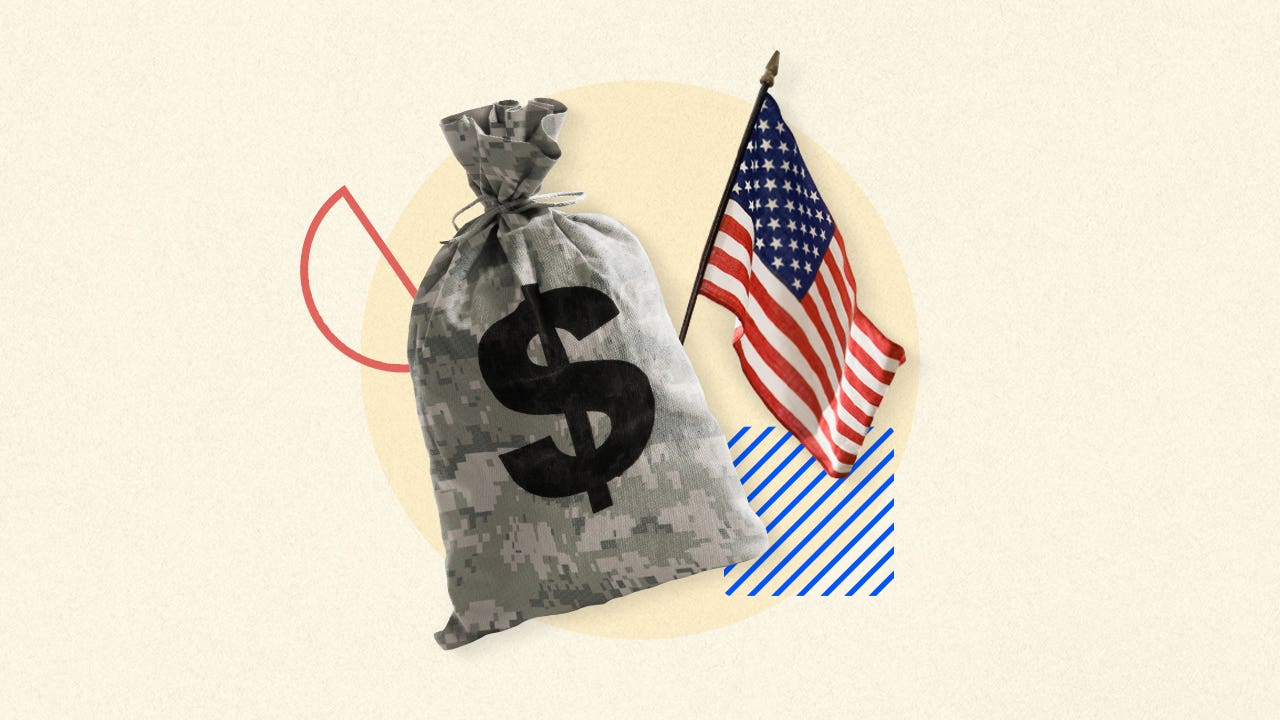VA loan benefits and disadvantages




Key takeaways
- VA loans offer many benefits such as no down payment or mortgage insurance, easier qualifications and lower interest rates.
- However, they also have drawbacks such as a required funding fee, property restrictions and potentially less equity to start.
- Alternatives to VA loans include conventional loans, FHA loans and USDA loans.
If you’re an eligible active-duty military member, veteran or surviving spouse, you can use a VA loan — guaranteed by the U.S. Department of Veterans Affairs (VA) — to buy a new property or refinance an existing mortgage. There are plenty of benefits of a VA home loan to consider. But drawbacks exist too.
Pros and cons of a VA loan
VA home loans can make homeownership more accessible. They are more flexible and offer 100 percent financing and other enticing perks.

Pros
- No down payment or mortgage insurance required
- Lower interest rates and fees
- Easier qualifications
- Assumable for veterans and civilians

Cons
- Funding fee required
- Property restrictions
- Less equity to start
- Stricter VA home appraisals
Benefits of a VA loan
Here are the major advantages of a VA loan.
No down payment required
While many conventional mortgages require a down payment of at least 20 percent of the purchase price, VA loans allow eligible borrowers to become homeowners without contributing a penny upfront. That makes a big difference: Twenty percent of aspiring American homeowners believe they’ll never be able to save enough for a down payment on a home, and another 12 percent believe they’ll need at least a decade or more, according to Bankrate’s latest Home Affordability Report.
No mortgage insurance
Some mortgages require only a small down payment. But it’ll cost you. FHA loans charge mortgage insurance — both an upfront premium and an annual premium throughout the loan term. You’ll also pay private mortgage insurance (PMI) on a conventional mortgage if your down payment is less than 20 percent. VA loans not only let you buy a home without a down payment but they also don’t require any insurance.
Lower interest rates and fees
Lenders tend to charge lower rates for VA loans than they do on conventional loans, which means you can save a lot of money on interest in the long run, especially over a 30-year loan. VA home loan closing costs might be less than those for other loans, as well, since the VA limits the origination fee a lender can charge to no more than 1 percent of the mortgage.
Easier qualifications
The VA doesn’t set a credit score minimum for borrowers, but some VA lenders might. Generally, this is around 620, the same as a conventional loan — though many may allow for lower scores. In addition, VA loans have more lenient DTI ratio requirements. They allow for a maximum DTI as high as 41 percent, compared to conventional loans which typically have a DTI limit of 36 percent unless you have compensating factors.
Convenient refinancing options
A VA cash-out refinance option allows qualified veterans to borrow up to 100 percent of their home’s value in cash at closing, though some lenders may limit the amount to 90 percent. Either way, that’s more than many refis, which limit you to 80 percent. If you just want a straight loan swap (no cash), you could opt for an Interest Rate Reduction Refinance Loan (IRRRL). It doesn’t require a home appraisal (unlike most refis). Plus, the funding fee on a VA IRRRL is relatively small: just 0.5 percent of the loan amount.
Assumable for veterans and civilians
VA loans are assumable, meaning that if you’re selling the home, your buyer can take over the mortgage instead of obtaining one of their own, even if they’re not a veteran. VA loan assumptions are especially beneficial when interest rates are rising. While loan assumptions require extra steps — the lender must approve, and the seller has to keep their full VA loan entitlement (which impacts future home purchases) — they can be an excellent perk for a buyer.
More lenient with bankruptcy and foreclosure
VA loans also offer more flexibility if you’ve encountered financial challenges — such as having declared bankruptcy or sold a home in a short sale, for example. The typical waiting period after a foreclosure is just two years with a VA loan. Compare that to three years with an FHA loan and up to seven years for a conventional mortgage.
Disadvantages of a VA loan
While VA loans offer many benefits, there are also drawbacks to consider.
Funding fee required
While you won’t pay for mortgage insurance with a VA loan, you will pay a funding fee at closing (although this fee can be financed into your loan, increasing the total amount you owe).
If you’re taking out your first VA loan and putting down less than 5 percent, the funding fee is 2.15 percent of the loan amount. The fee increases, however, if you get another VA loan and also put down less than five percent. If you make a down payment of five percent or more, the funding fee is smaller.
Here’s a breakdown of how the funding fee works in relation to the down payment size.
| Down payment | First use | After first use |
|---|---|---|
| Less than 5% | 2.15% | 3.3% |
| 5%-9.99% | 1.5% | 1.5% |
| 10% or more | 1.25% | 1.25% |
Not all borrowers are required to pay the funding fee. For example, if you receive compensation for service-connected disabilities or are a veteran’s surviving spouse, you might be exempt.
Property restrictions
VA loans limit the type of property you can buy and how you can use it. You can only buy a primary residence with a VA loan — no investment or rental properties unless you intend to live in one of the units. Manufactured homes are also subject to more scrutiny, including a structural engineering examination.
Less equity to start
The major upside of a VA loan is the ability to get a mortgage with no money down. However, that can be a downside, too. Because you haven’t put any cash into the home to begin with, it’ll take longer to build up equity (your outright ownership stake). Home equity is an important asset, one of the key benefits of homeownership.
If property values fall, you could end up underwater on your loan, owing more on the mortgage than what your home’s worth. This can make it much harder to sell your home or refinance to a new mortgage.
Stricter VA home appraisals
Another potential disadvantage of a VA loan is the stricter appraisal process. When using a VA loan to purchase a home, you must get an appraisal of the property. The appraisal’s purpose is to assess the property’s value and ensure that it is worth the agreed-upon purchase price. Appraisals are also meant to ensure that the home meets Minimum Property Requirements (MPRs) regarding safety, structural integrity and any health hazards. If an appraiser discovers any issues during their assessment, those issues must be resolved. The home must meet all MPRs before financing will be approved.
Is a VA loan the best option for you?
A VA loan offers special benefits that other financing does not. For many borrowers, the math works. However, even if you’re eligible, there are times when a VA loan might not be your best choice.
Here are some questions to ponder when deciding if a VA loan is the best deal:
- Do you want to reap big profits from a home sale? “If you are an eligible borrower who currently owns a home and wants to sell to yield a large down payment — 20 percent or more — to put toward your next home purchase, a VA loan may not make sense,” says Rob Killinger, senior loan officer at Movement Mortgage in Massachusetts. “If you were to use a VA loan in this scenario, you may be required to pay the VA funding fee, whereas a conventional loan program would not require such a fee.”
- Are you thinking of something other than a single-family home? “For instance, a qualified borrower could purchase a two- to four-unit property with a zero-down VA loan that they plan to live in,” says Killinger. “In comparison, a conventional loan requires a minimum 15 percent down on a multi-unit property.”
- Does VA loan financing turn off local sellers? Depending on your market and the individual seller, you might encounter some resistance. That’s because there are some myths about VA loans — that the paperwork can create closing delays or that the appraisal process can derail deals, for example. It can be helpful to work with a real estate agent who knows how to educate the seller’s agent on VA loans, debunk those myths and show that your offer is just as strong — if not stronger — than the competition’s.
-
Are you planning to relocate within two years? If so, it might not be worth paying the funding fee to get a VA loan.
Alternatives to VA loans
If you don’t think a VA loan is right for you, here are other alternatives:
- Conventional loan – There is no funding fee on a conventional loan, and you can use it to purchase primary homes, investment properties and second homes. You can expect a higher interest rate, and you’ll also need to make a down payment and pay mortgage insurance if it’s less than 20 percent.
- FHA loan – An FHA loan is also insured by the government but requires you to pay an upfront mortgage insurance premium and an annual mortgage insurance premium. As a result, the loan’s APR might also be higher, but qualifying could be easier especially if your credit needs work.
-
USDA loan – As with a VA loan, a USDA loan doesn’t require a down payment, but it’s only for borrowers in designated rural areas. USDA loans also come with income restrictions, and the property must be a single-family home.
Frequently asked questions
Why we ask for feedback Your feedback helps us improve our content and services. It takes less than a minute to complete.
Your responses are anonymous and will only be used for improving our website.
You may also like

Should you get a personal loan? Here are the pros and cons



